30 dec 2016
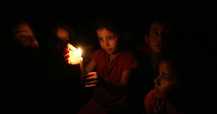
Gaza Electricity Distribution Company said that the power deficit in the Gaza Strip reached 70% during the daytime hours and 75% during the night hours.
In a leaflet distributed to the Media on Friday morning, the company stated that the total power available today is 185 MWs, pointing out that the amount of power needed in the Strip in this cold weather is approximately 600 MWs.
The company added that the Israeli electricity lines supply Gaza with 120 MWs, while Egyptian power to Gaza reaches 20 MWs and Gaza power station provides 45 MWs when its two generators are functioning.
It said that the amount of electricity currently available cannot be distributed according to an accurate schedule, affirming that it is exerting great efforts to deliver electricity to the houses and control the stability of the power in the electricity lines.
At the same time, the company called on those responsible to help improve the electricity services, encourage the fulfillment of payment obligations, and combat tampering with the electrical networks.
The Gaza Strip has been suffering for a decade a severe and considerable electricity crisis which reaches its peak in hot and cold weathers, when the Egyptian and Israeli feeding lines are disrupted, or when the power station stops working when it is not refueled.
In a leaflet distributed to the Media on Friday morning, the company stated that the total power available today is 185 MWs, pointing out that the amount of power needed in the Strip in this cold weather is approximately 600 MWs.
The company added that the Israeli electricity lines supply Gaza with 120 MWs, while Egyptian power to Gaza reaches 20 MWs and Gaza power station provides 45 MWs when its two generators are functioning.
It said that the amount of electricity currently available cannot be distributed according to an accurate schedule, affirming that it is exerting great efforts to deliver electricity to the houses and control the stability of the power in the electricity lines.
At the same time, the company called on those responsible to help improve the electricity services, encourage the fulfillment of payment obligations, and combat tampering with the electrical networks.
The Gaza Strip has been suffering for a decade a severe and considerable electricity crisis which reaches its peak in hot and cold weathers, when the Egyptian and Israeli feeding lines are disrupted, or when the power station stops working when it is not refueled.
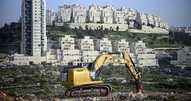
The Israeli occupation authorities (IOA) have seized about 13,295 dunums of Palestinian land during 2016, according to a report released on Thursday by the Palestinian Land Research Center (LRC).
Israel’s appropriation of Palestinian land increased by 43 percent during the current year compared to 2015, the report said.
During the reporting month, 9,700 fruitful trees, including 6,550 olive trees, were uprooted or sabotaged by the IOA and settlers.
The center also recorded 110 direct Israeli assaults on farmers and Bedouins and 195 attacks and violations on religious and historical sites, 100 of them occurred at the Aqsa Mosque.
The IOA also established 802 road barriers, most of them makeshift checkpoints, during the same year in different areas of the West Bank and Jerusalem.
Israel’s appropriation of Palestinian land increased by 43 percent during the current year compared to 2015, the report said.
During the reporting month, 9,700 fruitful trees, including 6,550 olive trees, were uprooted or sabotaged by the IOA and settlers.
The center also recorded 110 direct Israeli assaults on farmers and Bedouins and 195 attacks and violations on religious and historical sites, 100 of them occurred at the Aqsa Mosque.
The IOA also established 802 road barriers, most of them makeshift checkpoints, during the same year in different areas of the West Bank and Jerusalem.
29 dec 2016
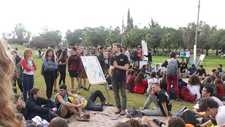
The Israeli Occupation Forces (IOF) demolished on Thursday morning a number of Palestinian facilities near Laban village to the west of Ramallah, local sources revealed.
The sources pointed out that IOF soldiers stormed along with a number of bulldozers the village and started demolishing several commercial shops and confiscated their goods and equipment.
The demolition orders came under the pretext of building without permit.
IOF demolished 1,023 Palestinian facilities in the West Bank and occupied Jerusalem since the beginning of 2016, 302 of them were funded by donor countries, a Palestinian rights group said on Wednesday.
The sources pointed out that IOF soldiers stormed along with a number of bulldozers the village and started demolishing several commercial shops and confiscated their goods and equipment.
The demolition orders came under the pretext of building without permit.
IOF demolished 1,023 Palestinian facilities in the West Bank and occupied Jerusalem since the beginning of 2016, 302 of them were funded by donor countries, a Palestinian rights group said on Wednesday.
28 dec 2016
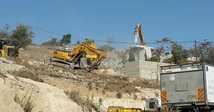
The Israeli occupation authority (IOA) bulldozers at dawn Wednesday knocked down Palestinian structures in Silwan town to the southeast of Occupied Jerusalem.
Palestinian citizen Mundher Seyam said Israeli bulldozers, escorted by special police troops, rolled into Ein al-Lawza neighborhood, in Silwan, at 6 a.m. and demolished structures built on his private land lots.
The demolition procedure targeted a storeroom built 30 years ago and a number of agricultural containers covering an area of about 20 square meters each.
The demolitions were carried out under the pretext of unlicensed construction.
The occupation bulldozers further razed a commercial shop owned by the Abu Hudwan family near the al-Maghareba quarter in Silwan.
At least 230 Palestinian buildings and structures have been knocked down by the Israeli occupation authorities in and around Occupied Jerusalem since the start of 2016.
Palestinian citizen Mundher Seyam said Israeli bulldozers, escorted by special police troops, rolled into Ein al-Lawza neighborhood, in Silwan, at 6 a.m. and demolished structures built on his private land lots.
The demolition procedure targeted a storeroom built 30 years ago and a number of agricultural containers covering an area of about 20 square meters each.
The demolitions were carried out under the pretext of unlicensed construction.
The occupation bulldozers further razed a commercial shop owned by the Abu Hudwan family near the al-Maghareba quarter in Silwan.
At least 230 Palestinian buildings and structures have been knocked down by the Israeli occupation authorities in and around Occupied Jerusalem since the start of 2016.
26 dec 2016
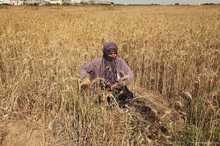
Farmer inspects crops damaged by Israel in Gaza
The Palestinian ministry of agriculture has warned local people that the Israeli occupation authorities are going to spray pesticides along the Gaza border between 25 December and 5 January. The ministry’s statement was reported by a number of media outlets.
“This is an annual Israeli activity which takes place at the end of the year to get rid of unneeded grass in this farming strip along the border,” the General Director of the Ministry of Agriculture in Gaza, Younis Al-Zaytouniyeh, told Quds Press.
He noted that the Israeli pesticides have a negative effect on Palestinian crops. This sometimes causes huge losses for Palestinian farmers in the besieged territory. Last year, he explained, most of the crops near the border were damaged.
The office of the International Committee of the Red Cross in the Gaza Strip informed the ministry of agriculture about the Israeli plan to spray the pesticides.
The Palestinian ministry of agriculture has warned local people that the Israeli occupation authorities are going to spray pesticides along the Gaza border between 25 December and 5 January. The ministry’s statement was reported by a number of media outlets.
“This is an annual Israeli activity which takes place at the end of the year to get rid of unneeded grass in this farming strip along the border,” the General Director of the Ministry of Agriculture in Gaza, Younis Al-Zaytouniyeh, told Quds Press.
He noted that the Israeli pesticides have a negative effect on Palestinian crops. This sometimes causes huge losses for Palestinian farmers in the besieged territory. Last year, he explained, most of the crops near the border were damaged.
The office of the International Committee of the Red Cross in the Gaza Strip informed the ministry of agriculture about the Israeli plan to spray the pesticides.
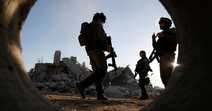
The Israeli Occupation Authorities (IOA) issued Monday morning demolition orders against 20 Palestinian-owned facilities in Yatta town, south of al-Khalil, for allegedly being built without permit.
Local activist Rateb Jabour affirmed that Israeli civil administration crews handed over demolition notifications against 16 houses, south of the town.
A mosque and three solar panels were also notified with demolition in the area, he added.
The notified facilities were funded by international organizations.
Jabour called for putting an end to Israeli demolition policy which left hundreds of Palestinian families homeless especially in this particular cold weather.
Demolitions in the occupied West Bank and Jerusalem have seen an unprecedented upsurge in recent months, as Israeli authorities demolished 905 Palestinian structures in the occupied Palestinian territories so far this year, in a big increase from 453 in all of 2015, according to UN documentation.
Local activist Rateb Jabour affirmed that Israeli civil administration crews handed over demolition notifications against 16 houses, south of the town.
A mosque and three solar panels were also notified with demolition in the area, he added.
The notified facilities were funded by international organizations.
Jabour called for putting an end to Israeli demolition policy which left hundreds of Palestinian families homeless especially in this particular cold weather.
Demolitions in the occupied West Bank and Jerusalem have seen an unprecedented upsurge in recent months, as Israeli authorities demolished 905 Palestinian structures in the occupied Palestinian territories so far this year, in a big increase from 453 in all of 2015, according to UN documentation.
24 dec 2016
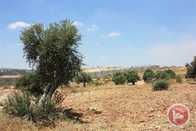
A major American department store chain has been selling products imported from Bethlehem as products of Israel, despite Bethlehem being located in the occupied Palestinian territory, according to a report from a public radio station in Texas, US.
KETR reported last week that Bethlehem mayor Vera Baboun was “astonished” after she discovered that Neiman Marcus, which is based in the Texas city of Dallas, was selling nativity scenes that were crafted from olive wood in the occupied West Bank town, but labelled as products of Israel.
“This is illegal," Baboun told KETR. "It’s not Israel. Bethlehem is Palestine."
"It’s unacceptable ... From our side, from the olive wood store and from their side," she added. "God knows how much we are working in order to keep this a traditional and a national Bethlehemite product. And this is very important."
PLO official Xavier Abu Eid viewed the case as an attempt to "normalize" Israel's illegal annexation of Palestinian territory.
"To say that Bethlehem is part of Israel is not only an attempt to normalize the annexation of occupied territory. But it's also an attempt at fooling the consumers. The consumers have the right to know from where the product is coming. And this product in particular is coming from Bethlehem, Palestine," KETR quoted Abu Eid as saying.
A Neiman Marcus spokesperson did not directly respond to KETR’s request for comment, and only informed the radio station that their import division was "in charge of making sure all of our imported products, fashion, fur, home goods, etc. are properly labeled in accordance with all applicable laws."
However, Katrina Skinner, a spokeswoman for the US Customs and Border Protection, told KETR that origin labels bearing the name "Bethlehem, Israel" would not in fact be in compliance with federal regulations.
"With respect to the specific inquiry concerning the use of the marking 'Made in Bethlehem, Israel,' the language would be considered not legally marked in accordance with the policy stated in T.D. 97-16 because Bethlehem is within the West Bank," she said.
According to KETR's report, Neiman Marcus could face fines for not complying with the regulations, which increase “for egregious violations like undermining foreign sanctions, or for mislabeling products to indicate they were from areas subject to less taxes.”
US policy mandates that products made in in the occupied West Bank cannot bear the label “Made in Israel” -- guidelines established mainly to prevent Israeli settlers from using the label, as the US views Israel’s settlements in the occupied West Bank and East Jerusalem to be illegitimate.
However, the guidelines also apply to products made in the West Bank by Palestinians.
Regulations distinguishing Israel from the Palestinian territories date back to the 1990s. The Clinton administration issued the rules in 1995 and 1997 requiring unique origin labels for imports manufactured in Israel, as opposed to those produced in the West Bank or Gaza Strip.
According to the Palestinian Postal Services, demand from online shoppers for Palestinian products -- specifically olive wood handicrafts -- have noticeably increased over 2016.
Meanwhile, Palestinian policy network Al-Shabaka reported earlier this year that the ongoing Israeli occupation of Palestine has stifled Palestinian economic growth while producing billions of dollars in Israeli revenue.
KETR reported last week that Bethlehem mayor Vera Baboun was “astonished” after she discovered that Neiman Marcus, which is based in the Texas city of Dallas, was selling nativity scenes that were crafted from olive wood in the occupied West Bank town, but labelled as products of Israel.
“This is illegal," Baboun told KETR. "It’s not Israel. Bethlehem is Palestine."
"It’s unacceptable ... From our side, from the olive wood store and from their side," she added. "God knows how much we are working in order to keep this a traditional and a national Bethlehemite product. And this is very important."
PLO official Xavier Abu Eid viewed the case as an attempt to "normalize" Israel's illegal annexation of Palestinian territory.
"To say that Bethlehem is part of Israel is not only an attempt to normalize the annexation of occupied territory. But it's also an attempt at fooling the consumers. The consumers have the right to know from where the product is coming. And this product in particular is coming from Bethlehem, Palestine," KETR quoted Abu Eid as saying.
A Neiman Marcus spokesperson did not directly respond to KETR’s request for comment, and only informed the radio station that their import division was "in charge of making sure all of our imported products, fashion, fur, home goods, etc. are properly labeled in accordance with all applicable laws."
However, Katrina Skinner, a spokeswoman for the US Customs and Border Protection, told KETR that origin labels bearing the name "Bethlehem, Israel" would not in fact be in compliance with federal regulations.
"With respect to the specific inquiry concerning the use of the marking 'Made in Bethlehem, Israel,' the language would be considered not legally marked in accordance with the policy stated in T.D. 97-16 because Bethlehem is within the West Bank," she said.
According to KETR's report, Neiman Marcus could face fines for not complying with the regulations, which increase “for egregious violations like undermining foreign sanctions, or for mislabeling products to indicate they were from areas subject to less taxes.”
US policy mandates that products made in in the occupied West Bank cannot bear the label “Made in Israel” -- guidelines established mainly to prevent Israeli settlers from using the label, as the US views Israel’s settlements in the occupied West Bank and East Jerusalem to be illegitimate.
However, the guidelines also apply to products made in the West Bank by Palestinians.
Regulations distinguishing Israel from the Palestinian territories date back to the 1990s. The Clinton administration issued the rules in 1995 and 1997 requiring unique origin labels for imports manufactured in Israel, as opposed to those produced in the West Bank or Gaza Strip.
According to the Palestinian Postal Services, demand from online shoppers for Palestinian products -- specifically olive wood handicrafts -- have noticeably increased over 2016.
Meanwhile, Palestinian policy network Al-Shabaka reported earlier this year that the ongoing Israeli occupation of Palestine has stifled Palestinian economic growth while producing billions of dollars in Israeli revenue.
19 dec 2016
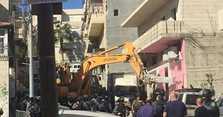
The Israeli bulldozers demolished on Monday a commercial facility in the French Hill area in occupied Jerusalem despite being licensed.
Hesham Harhash, one of the owners of Harhash car exhibition that was razed, said that a crew from the Israeli municipality accompanied by special military forces and bulldozers stormed into the exhibition owned by his family and destroyed it.
Harhash told the Quds Press news agency that the exhibition's area is about one dunum, adding that it was built in 2006 and the family was able to get a permit in 2008.
The Palestinian lawyer Mohannad Jbara said that the Israeli municipality has been trying since 2012 to seize the land of the exhibition to construct a bus station for the Israeli settlers who come to visit the neighboring "French Hill" park.
Jbara added that the Israeli municipality has lost the case in all courts, and when they came today, they did not possess a new demolition order but an order issued in 2013 to demolish a part of the exhibition (which was implemented at the time).
Jbara said that Israel follows a new policy which involves implementing the demolition orders in the early morning hours so as to thwart any attempt to stop the demolition.
Since the beginning of this year, the Israeli occupation authorities demolished more than 866 residential and commercial buildings in Jerusalem and the West Bank under the pretext of building without a permit. The demolition operations left 1,221 Palestinians homeless, half of whom are children.
The demolition operations have massively increased in Jerusalem and its environs this year reaching more than 230 demolition operations.
Hesham Harhash, one of the owners of Harhash car exhibition that was razed, said that a crew from the Israeli municipality accompanied by special military forces and bulldozers stormed into the exhibition owned by his family and destroyed it.
Harhash told the Quds Press news agency that the exhibition's area is about one dunum, adding that it was built in 2006 and the family was able to get a permit in 2008.
The Palestinian lawyer Mohannad Jbara said that the Israeli municipality has been trying since 2012 to seize the land of the exhibition to construct a bus station for the Israeli settlers who come to visit the neighboring "French Hill" park.
Jbara added that the Israeli municipality has lost the case in all courts, and when they came today, they did not possess a new demolition order but an order issued in 2013 to demolish a part of the exhibition (which was implemented at the time).
Jbara said that Israel follows a new policy which involves implementing the demolition orders in the early morning hours so as to thwart any attempt to stop the demolition.
Since the beginning of this year, the Israeli occupation authorities demolished more than 866 residential and commercial buildings in Jerusalem and the West Bank under the pretext of building without a permit. The demolition operations left 1,221 Palestinians homeless, half of whom are children.
The demolition operations have massively increased in Jerusalem and its environs this year reaching more than 230 demolition operations.
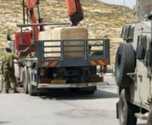
Israeli soldiers imposed, on Monday at dawn, a strict siege, and closed roads with concrete blocks and sand hills, isolating the village of Shuqba and Rantis villages, northeast of Ramallah in the occupied West Bank, and prevented the Palestinians from entering or leaving them.
The soldiers first invaded Rantis village, before breaking into dozens of homes and violently searching then, and imposed a strict siege on it, preventing the residents, including workers, employees and students, from entering or leaving it.
The soldiers also installed a military roadblock on the western entrance of the village, the only road that wasn’t blockaded with sand hills and concrete blocks, and prevented the Palestinians from crossing.
Similar violations took place in Shuqba village, that was also left isolated and blockaded, while the soldiers stopped dozens of Palestinians, and interrogated many Palestinians while inspecting their ID cards.
All workers, including teachers and healthcare professionals, were not allowed to enter or leave the village, especially since many teachers are from nearby villages, an issue that forced all schools, and many business shut.
The Israeli army claimed the closures were enforced after a shooting attack that left one Israeli colonist injured, near ‘Aboud village, northwest of Ramallah.
The soldiers invaded ‘Aboud, and searched homes, before surrounding and isolating it, including placing concrete blocks, and prevented the Palestinians from entering or leaving it.
The soldiers first invaded Rantis village, before breaking into dozens of homes and violently searching then, and imposed a strict siege on it, preventing the residents, including workers, employees and students, from entering or leaving it.
The soldiers also installed a military roadblock on the western entrance of the village, the only road that wasn’t blockaded with sand hills and concrete blocks, and prevented the Palestinians from crossing.
Similar violations took place in Shuqba village, that was also left isolated and blockaded, while the soldiers stopped dozens of Palestinians, and interrogated many Palestinians while inspecting their ID cards.
All workers, including teachers and healthcare professionals, were not allowed to enter or leave the village, especially since many teachers are from nearby villages, an issue that forced all schools, and many business shut.
The Israeli army claimed the closures were enforced after a shooting attack that left one Israeli colonist injured, near ‘Aboud village, northwest of Ramallah.
The soldiers invaded ‘Aboud, and searched homes, before surrounding and isolating it, including placing concrete blocks, and prevented the Palestinians from entering or leaving it.
